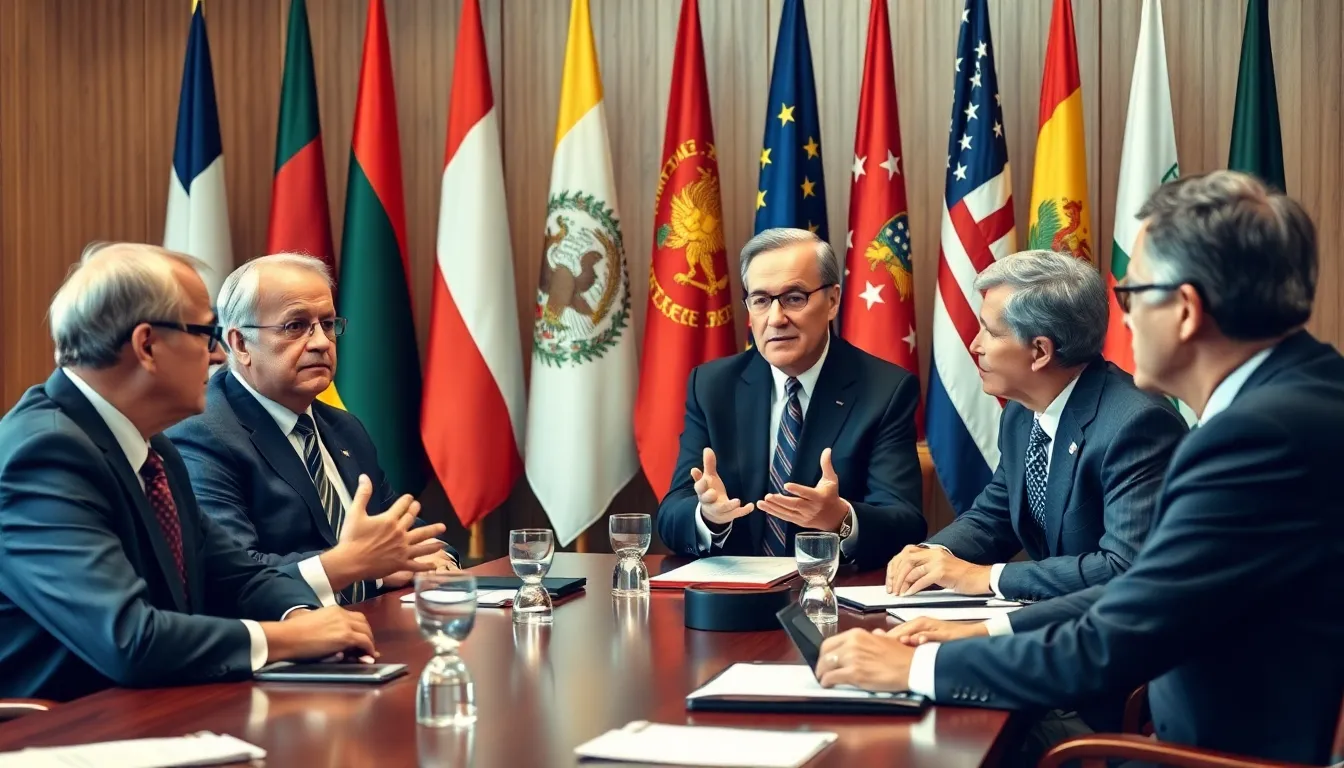In a world where tensions run high and misunderstandings can spark chaos faster than a cat video goes viral, diplomatic solutions have never been more crucial. Picture this: nations sitting around a table, sipping coffee instead of launching missiles. It might sound like a scene from a quirky sitcom, but the reality is that diplomacy can be the unsung hero in resolving conflicts.
When countries choose dialogue over drama, they not only save face but also pave the way for lasting peace. Diplomatic solutions are like the superhero capes of international relations—transforming adversaries into allies with a few well-placed words and a dash of compromise. So, buckle up as we explore how these clever strategies can turn potential disasters into success stories, proving once and for all that sometimes, talking it out really is the best policy.
Table of Contents
ToggleImportance Of Diplomatic Solutions
Diplomatic solutions carry significant weight in maintaining global stability. Engaging in discussions instead of conflicts can lead to mutual understanding and cooperation.
Historical Context
In early history, treaties marked critical turning points between warring states. The Treaty of Westphalia in 1648 established the concept of state sovereignty among European nations. Such agreements transformed international relations by emphasizing negotiation. The League of Nations, formed after World War I, represented an early attempt to prevent future conflicts through diplomacy. These historical milestones highlight the evolution of diplomacy as a necessary tool for peace and coexistence.
Modern Relevance
Today, diplomatic solutions remain vital in addressing global issues like climate change and trade disputes. Nations increasingly rely on dialogue to navigate complex relationships. The Paris Agreement showcases how countries can collaborate to combat environmental challenges through negotiation. Ongoing talks in conflict zones demonstrate that diplomacy can de-escalate tensions and foster resolutions. Current geopolitical dynamics underscore the importance of sustained diplomatic efforts to achieve stability and security worldwide.
Key Principles Of Diplomatic Solutions

Diplomatic solutions rely on several core principles that ensure effective engagement between nations. Understanding these principles encourages successful conflict resolution.
Communication And Negotiation
Effective communication forms the backbone of diplomacy. Clarity in messaging allows parties to express their interests and concerns accurately. Listening actively enables negotiators to understand opposing viewpoints better. Transparency fosters trust and openness, creating a conducive atmosphere for dialogue. Engaging in regular discussions helps prevent misunderstandings. Utilizing frameworks for negotiation can streamline the process, making it easier to navigate complex issues. Successful negotiations often result in agreements tailored to the needs of all involved parties.
Compromise And Collaboration
Compromise serves as a crucial component of diplomatic efforts. Achieving balance between differing interests often leads to sustainable solutions. Collaboration invites shared responsibility, increasing ownership of agreements among nations. Flexibility during negotiations helps parties adapt their positions as discussions progress. Commitment to working together strengthens relationships, encouraging future cooperation. Parties that seek win-win outcomes tend to foster long-term peace. Building coalitions can amplify voices and facilitate consensus, paving the way for effective resolutions.
Case Studies Of Successful Diplomatic Solutions
Several case studies exemplify successful diplomatic solutions that have changed the course of international relations.
The Camp David Accords
The Camp David Accords, signed in 1978, marked a pivotal moment between Egypt and Israel. Led by U.S. President Jimmy Carter, the negotiations resulted in the first peace treaty between Israel and an Arab nation. Both nations made significant concessions, with Egypt recognizing Israel’s right to exist and Israel withdrawing from the Sinai Peninsula. The accords laid the foundation for future peace talks in the region, demonstrating how intense negotiations can yield lasting benefits. This agreement not only improved bilateral relations but also set a precedent for addressing larger Middle Eastern conflicts.
The Iran Nuclear Deal
The Iran Nuclear Deal, formally known as the Joint Comprehensive Plan of Action (JCPOA), emerged in 2015 after years of negotiations among world powers. Key objectives included preventing Iran from developing nuclear weapons while ensuring civilian nuclear energy development. In exchange for limits on its nuclear program, Iran received relief from economic sanctions. This multilateral agreement included nations such as the United States, the United Kingdom, France, Russia, China, and Germany. Successful implementation proved critical in showcasing how diplomacy can effectively address global security concerns, fostering extended dialogue and reducing tensions in the region.
Challenges Facing Diplomatic Solutions
Diplomatic solutions face numerous challenges that hinder effective communication and negotiation. Geopolitical tensions significantly complicate these efforts, resulting in mistrust among nations. Rising nationalism often leads to adversarial relationships, which can increase hostility between states. Competing interests in resource-rich regions frequently exacerbate conflicts, making cooperation nearly impossible. Leaders may prioritize short-term political gain over long-term diplomatic engagement, undermining progress. Additionally, the presence of military alliances can further polarize discussions, diminishing the chances of reaching consensus.
Cultural barriers also present significant challenges to diplomatic solutions. Differences in language can lead to misunderstandings and misinterpretations between nations. Varied historical contexts shape how countries perceive one another, often creating biases and preconceived notions. Negotiators may struggle to find common ground when cultural values clash, causing frustration and impeding cooperation. Different communication styles create additional obstacles, as some cultures emphasize directness while others prefer a more indirect approach. Awareness of these cultural nuances is crucial for fostering an environment conducive to successful diplomatic engagement.
Diplomatic solutions serve as a crucial mechanism for navigating the complexities of international relations. By prioritizing dialogue and negotiation over conflict, nations can foster understanding and cooperation. The historical successes of treaties and agreements illustrate the potential for diplomacy to yield lasting peace.
As global challenges continue to evolve, the need for effective communication becomes even more pressing. Embracing the principles of flexibility and collaboration can transform adversarial relationships into partnerships. In a world where tensions often run high, the commitment to diplomatic engagement remains essential for achieving stability and security.







